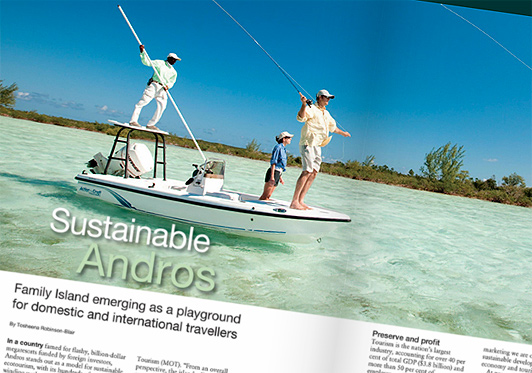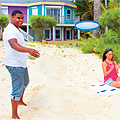| Published: Date: Updated: Author: |
The Bahamas Investor Magazine January 1, 2016 January 1, 2016 Tosheena Robinson-Blair |
In a country famed for flashy, billion-dollar megaresorts funded by foreign investors, Andros stands out as a model for sustainable ecotourism, with its hundreds of miles of winding wetlands, rare wildlife and small resort industry largely developed by locals.
Click here to read or browse this feature using Turn-Page/Ezine mode.
“Andros represents a living island in terms of the amount of biodiversity that’s there naturally,” says Benjamin Pratt, a manager of sustainable tourism within the Ministry of Tourism (MOT). “From an overall perspective, the island offers great natural assets that could be developed for the people who live there.”
With national parks, world-class fishing, the third-largest barrier reef in the world, blue holes, underwater caves, along with hunting and birding experiences, Andros is ideally suited to take advantage of the growing demand for ecotourism.
Preserve and profit
Tourism is the nation’s largest industry, accounting for over 40 per cent of total GDP ($3.8 billion) and more than 50 per cent of employment in 2014, according to MOT statistics. But a lot of that activity is concentrated on a few islands. This is something the MOT is looking to change.
“The islands of The Bahamas have so much to offer as a holiday destination beyond Nassau, Paradise Island and Grand Bahama,” says Ellison Thompson, deputy director general, MOT. “With the correct positioning, developing products to deliver on that positioning, supported by the appropriate marketing we are on our way to sustainable development of Andros’s economy and tourism product.”
At present, the tourism potential of Andros remains largely untapped. A study funded by The Nature Conservancy suggests the island’s natural resources could potentially generate up to $260 million annually. “Andros has always been considered ‘the Big Yard’ of The Bahamas,” says Jacqueline Ramsey, the MOT’s director of domestic tourism. “We need to provide nature tours in abundance. We’re missing a lot, especially in terms of domestic tourism.”
To further this effort, the Bahamian government secured a $600,000 grant from the Inter-American Development Bank (IDB) in 2015 to help chart Andros’s economic growth in an environmentally friendly, sustainable manner to the benefit of its 7,000-strong population and the nation at large. Part of the grant has already been invested in the island’s infrastructure, with upgrades to the roads in north and central Andros, the airport and a new dock for Fresh Creek.
Realizing potential
Measuring 104 miles long and 40 miles wide, Andros is simply too promising to remain a secret much longer, says Peter Douglas, the Andros-based MOT manager for sustainable tourism. “Because of its massive size you could truly use this island as a role model for high-end, sustainable, ecotourism development,” he says.
In the next five to 10 years, Douglas, who also serves as the executive director of the Andros Conservancy and Trust (ANCAT), hopes to see visitor arrivals to the island grow from the current 8,000-10,000 per annum to around 20,000-30,000.
“We’d like to see a well-established, sustainable ecotourism industry with an additional 300 rooms disbursed throughout the island in small boutique resorts. The goal is to preserve and profit in equal measure. We have seen a slow but steady growth in the domestic tourism market because of our proximity to Nassau. People are using Andros as a getaway, outback, weekend destination spot,” says Douglas.
Flights from the capital to Andros are frequent and relatively inexpensive, costing around $70 one-way and $120 round-trip. Travellers are also taking advantage of the reasonably priced second homes popping up for rent online, although the ministry is trying to regulate that market. “Six years ago we had about four or five properties, now we have almost 100 properties on Andros that are for rent on the Internet as private homes,” says Douglas.
Bigger projects are also in the pipeline. At press time, the full-service hotel Emerald Palms, the largest resort of its kind on the island, was about to be sold and reopened reportedly under the same name. With its 18 clubhouse rooms and 22 one- and two-bedroom villas the reopening was expected to be a huge boon to the local economy.
The chief executive officer of Sky Bahamas Airlines Ltd Randy Butler is also banking on the rich biodiversity of the nation’s largest island to propel this “sleeping giant” to the forefront of the ecotourism market.
“I’m one of those persons who wants Andros’s development to be sustainable for generations to come,” says Butler, who was born and raised on Andros and has been investing in the island for more than 15 years. His family’s acquisitions include the Andros Island Beach Resort in Nicholls Town with its oceanfront views, rustic tiki bar, conference centre and 12 rental cottages. He also has other prime properties on the island that are “poised” for development. “As a domestic investor, I see the potential for ecotourism to take-off for Andros,” says Butler, whose seven-fleet airline operates regularly scheduled and charter services throughout The Bahamas, Fort Lauderdale, Florida and Providenciales, Turks & Caicos. “I’m working to connect Andros to South Florida through regularly scheduled Sky Bahamas flights.”
The allure
So, is all this investment in ecotourism projects justified? A largely undeveloped island, the 1.5 million acres national park system in Andros is the country’s largest protected area providing a habitat for several rare and endangered species. Not only do the parks preserve land crab habitats, sections of the Andros Barrier Reef, pine forests and freshwater lens, the large areas of wetlands, it also safeguards important nurseries for conch, lobster and fish.
It is the parks system that provides a habitat for the rare Bahamian boa, the endangered Andros rock iguana, the West Indian flamingo, and the atala hairstreak butterfly, which at one point was believed to be extinct.
Still, of all the protected habitats, the coral reef areas are believed to be the most diverse and species rich, according to ANCAT, with spectacular snorkelling and dive sites featuring miles of bountiful reef.
On the eastern side of Andros, the Tongue of the Ocean provides great opportunities for sport fishing marlin, tuna and other big game fish. On the west coast of the island sits the Great Bahama Bank, a shallow water area where most of the commercial fishing in the country takes place.
Just north of Andros lies the Joulter Cays used by sport fishermen who target bonefish on the flats and in the creeks and commercial fishermen who harvest bottom feeding fish such as grouper, snappers and grunts. Lobster and stone crabs are caught on the reef, and on the banks commercial harvesters pursue sponge and conch.
With such marine abundance, recreational fishing is a popular outdoor activity among visitors to The Bahamas, according to a 2010 study conducted by researcher Dr Tony Fedler for the Bahamas Flat Fishing Alliance. Fedler’s report asserts that flat fishing at the time generated $141 million in total economic benefits to the Bahamian economy annually with $70 million spent directly in the island economies. According to Fedler, flat fishing in Andros accounted for 81 per cent of the island’s tourism expenditure.
“One of the big things about Andros that gives it a strong sustainable base is the amount of small fishing lodges that are owned by locals and that have been holding steady for a long time,” says Douglas. “Now we have Bahamians who are moving into the super high end of the fishing resort market, such as Broad Shad Cay Lodge investor Andy Smith who is a third-generation Bahamian and world-class fishing guide. He has what you call a super-high-end fishing lodge. The rich and famous spend around $7,000 per night, per person.”
With the IDB grant, the government is moving to train even more fishing guides. “There is now a demand for guides to provide this service,” says the MOT’s Pratt. “Statistics are showing that international travellers are interested in how we are managing our resources and so we are placing more emphasis on sustainable development.”
Bird in the bush
As a part of the sustainable development programme, birding guides are also undergoing training. “To cause diversity and to spark growth, one of the things we are really concentrating on is the birding tourism, special niche market,” says the MOT director Ramsey.
“We are very adamant about training our people to be able to deliver first-class tours,” she says. Thus, a portion of the IDB funds are being used to stage pilot guide programmes for 80 would-be bird guides–30 in Andros and 50 in Inagua. The bird-based tourism course is based on a collaborative effort of the MOT, the National Audubon Society and the Bahamas National Trust (BNT). The ultimate goal of this project is to increase local capacity of skilled local birding guides to create sustainable jobs in communities, while simultaneously protecting biodiversity and natural resources.
“The Bahamas National Trust sees the bird tourism project as an opportunity to form stronger links between the six Andros national parks and the tourism sector,” says Eric Carey, BNT executive director. “This project will demonstrate the economic value of their national parks to Androsians, through direct job creation, and by supporting businesses on Andros.
According to the BNT, the country has over 340 bird species, including 109 that breed on the islands, 169 migrant species and 45 vagrants which are spotted only a few times each year.
“Andros Island offers a great opportunity for nature tourism, especially bird-based tourism. With hundreds of bird species, and four of the six endemic species, including the Bahama oriole, which can only be seen on Andros, it is the ideal destination for the bird tourist wanting to escape into nature,” says Matthew Jeffery, deputy director of Audubon’s International Alliances Program. “Audubon is working with BNT and MOT to develop resident guided tours and engage local businesses to make the most of the large and growing birding tourism industry. A short flight from Nassau and US, Andros is the perfect springboard to take advantage of these exciting opportunities.”
For those who live in the“Big Yard,” Andros’s potential isn’t the least bit surprising. “The environment has always been special and wonderful,” says Douglas. “It is a special spot in the world. Ecotourism has been steadily growing and we’re becoming a bigger player in this industry.”










